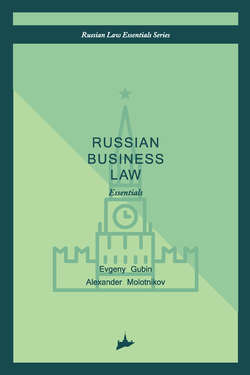Читать книгу Russian business law: the essentials - - Страница 15
Evgeny Arkhipov[15]
Chapter 1 – Business Legislation
5. The Subordinate Legislation
Оглавление5.1. Subordinate Legal Acts of Public Authorities
5.1.1. Acts of the President of the Russian Federation
The legal acts of the President of Russia follow federal laws in the hierarchy of legal acts. The acts of the President of Russia should not contradict to the Constitution of Russia and the federal laws (part 3 of Article 90 of the Constitution of Russia).
The president of Russia issues acts of two types: decrees and orders.[21] As a rule, orders, unlike decrees, do not possess a normative character. Currently, the President of Russia has issued a few acts which regulate entrepreneurial activities.
5.1.2. Acts of the Government of the Russian Federation
The Government of Russia issues decisions and orders. They should not contradict the Constitution of Russia, federal laws, and decrees of the President of Russia (Article 115 of the Constitution of the Russian Federation).
5.1.3. Acts of the Ministries
The federal ministries adopt acts (generally those are commands and orders), on the basis and in accordance with the Constitution of Russia, the federal laws, the acts of the President and the Government of Russia.
5.1.4. Acts of Federal Agencies and Services
In the Russian Federation, all federal executive authorities, except for the Government of Russia and the Ministries, are two types: agencies and services. Agencies carry out the functions of providing state services, of management of the state property, and law-enforcement functions. The main function of the services is the exercising of control and supervision in the established field of activity. Both agencies and services issue law-enforcement acts, as well as normative legal acts in certain cases.
Federal agencies and services issue a large number of legal acts, which regulate some issues of entrepreneurial activities in detail.
5.2. Other Subordinate Legal Acts
Apart from government bodies, the power of adoption of obligatory acts in Russia is possessed by such formations of sui generis, including:
5.2.1. Central Bank of the Russian Federation (Hereafter CBR)
The CBR carries out the regulation of banking activities, the financial markets, monetary, and currency regulation. Thus, the Bank of Russia in particular establishes the rules of the implementation of calculations within the Russian Federation, rules on carrying out banking operations, exercises regulation, control, and supervision in the sphere of the corporate relations in joint stock companies, defines the procedure of calculations with international organizations, foreign states, as well as with legal entities and individuals.
On matters relevant to the CBR Law and other federal laws, the Bank of Russia issues normative acts in the form of orders, rules, and instructions that are obligatory for federal public authorities, public authorities of the subjects of the Russian Federation, local authorities, individuals, and all legal entities.
5.2.2. State Corporations
State corporations, being structures of sui generis, can be provided with various powers, including powers on the adoption of normative legal acts (see, for example, Article 8 of FL on Rosatom).
Thus, Rosatom State Corporation on Atomic Energy adopted an order No. 1/19-NPA (as of December 6, 2013), which stipulates the obligatory forms of reports in the field of state registration and control over radioactive materials and radioactive waste, as well as the order and terms of providing reports.
21
Additionally, this type of an act of the President of Russia as an assignment/order has recently been widely adopted. The orders of the President do not contain norms obligatory for legal entities and citizens. These documents contain provisions obligatory for subordinate governmental authorities reflecting, as a rule, the most accurate directions of the development of the legislation and the state policy in general. An understanding of some orders of the President of Russia can be useful for entrepreneurs.
